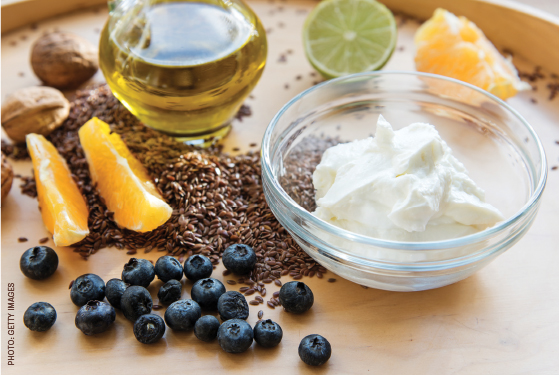
Ting Bao, MD, DABMA, MS

Jyothirmai Gubili, MS
The ASCO Post’s Integrative Oncology series is intended to facilitate the availability of evidence-based information on integrative and complementary therapies sometimes used by patients with cancer. In this installment, Ting Bao, MD, DABMA, MS, and Jyothirmai Gubili, MS, focus on the Budwig diet, because of patients’ continued interest in seeking alternatives to conventional treatments. Clinical evidence, however, is currently lacking to support the use of this diet for the treatment or prevention of cancer.
Common Names: Budwig protocol, flaxseed oil diet, linseed oil diet, flax oil and cottage cheese diet, oil-protein diet, Cellect-Budwig protocol,
Bill Henderson protocol
Overview
An alternative unproven cancer therapy created in the 1950s, the Budwig diet involves consuming multiple daily servings of flaxseed oil and cottage cheese, vegetables, fruits, and juices. The regimen also calls for avoiding all processed foods, shellfish, meats, most dairy products, and sugar. In addition, daily sunbathing is encouraged, and the diet is often combined with the practice of coffee enemas.
OF NOTE
Physicians should be aware of patients’ interest in unproven cancer treatments such as the Budwig diet and the nutritional deficiencies resulting from restrictive diets. For instance, coffee enemas can cause electrolyte imbalance, infections, inflammation of the rectum and colon, and burns.Epidemiologic data suggest an association between lactovegetarian diets and a lower incidence of gastrointestinal cancer.1,2 However, with the exception of anecdotal evidence and books written by Johanna Budwig, the developer, this diet has not been evaluated in clinical trials.
The Science
The Budwig diet is based on the hypothesis that cancer develops as a result of decreased oxygen uptake by cell membranes in the absence of omega-3 fatty acids.3 Although metabolic changes such as increased aerobic glycolysis and fatty acid synthesis occur in cancerous cells,4 the role of omega-3 fatty acids in the pathogenesis and treatment of cancer is not known.5

Johanna Budwig believed that combining cottage cheese and flaxseed oil (which are rich in omega-3 fatty acids) permitted better availability of essential fatty acids through the plasma membrane, allowing for improved aerobic cellular respiration. Processed fats, saturated fats, animal fats, processed foods, and sugar are prohibited, as they are thought to interfere with oxygen uptake and cellular respiration.6
Available data indicate that flaxseed exerts antineoplastic and hormonal effects.7,8 Flaxseed oil was shown to decrease the levels of proinflammatory cytokines, tumor necrosis factor alpha, as well as interleukin-1 beta.9 Also, tumor regression in mice that were treated with trastuzumab and flax oil was greater when compared with mice treated with trastuzumab alone.10
However, there are no reports of clinical assessments of the Budwig diet in the literature.
Adverse Reactions
- Use of tanning beds and excessive exposure to the sun can elevate the risk of melanoma and skin cancers.11
- Flaxseed consumption is associated with gastrointestinal discomfort, including gas, bloating, constipation, stomachache, and frequent bowel movements.12
- The Budwig diet can place lactovegetarians at a greater risk for vitamin B12 deficiency.13
Contraindications
- Bleeding Disorders: Flaxseed oil was reported to increase bleeding time and platelet activating inhibitor-1 in a murine model.14
- Pregnancy: A flaxseed-containing diet during pregnancy or lactation was found to elevate the risk of mammary cancer in the offspring in a murine model.15
Summary
Clinical evidence is currently lacking to support the use of the Budwig diet and the associated lifestyle for treating or preventing cancer. Patients should not pursue it during or after cancer treatments, and they should especially not delay or avoid mainstream care.
DISCLOSURE: Dr. Bao has served as a consultant or advisor to Eisai. Ms. Gubili reported no conflicts of interest.
REFERENCES
1. Tantamango-Bartley Y, Jaceldo-Siegl K, Fan J, et al: Vegetarian diets and the incidence of cancer in a low-risk population. Cancer Epidemiol Biomarkers Prev 22:286-294, 2013.
2. Craig WJ, Mangels AR, American Dietetic Association: Position of the American Dietetic Association: Vegetarian diets. J Am Diet Assoc 109:1266-1282, 2009.
3. Budwig J: Cytostatic or cytodynamic control of cancer. Hippokrates 27:605-612, 1956.
4. Zhao Y, Butler EB, Tan M: Targeting cellular metabolism to improve cancer therapeutics. Cell Death Dis 4:e532, 2013.
5. Cockbain AJ, Toogood GJ, Hull MA: Omega-3 polyunsaturated fatty acids for the treatment and prevention of colorectal cancer. Gut 61:135-149, 2012.
6. Budwig Center: Food chart: Foods to avoid and foods to consume. Available at http://www.budwigcenter.com/the-budwig-diet/. Accessed February 14, 2020.
7. Demark-Wahnefried W, Polascik TJ, George SL, et al: Flaxseed supplementation (not dietary fat restriction) reduces prostate cancer proliferation rates in men presurgery. Cancer Epidemiol Biomarkers Prev 17:3577-3587, 2008.
8. Lee J, Cho K: Flaxseed sprouts induce apoptosis and inhibit growth in MCF-7 and MDA-MB-231 human breast cancer cells. In Vitro Cell Dev Biol Anim 48:244-250, 2012.
9. Holm T, Berge RK, Andreassen AK, et al: Omega-3 fatty acids enhance tumor necrosis factor-alpha levels in heart transplant recipients. Transplantation 72:706-711, 2001.
10. Mason JK, Chen J, Thompson LU: Flaxseed oil-trastuzumab interaction in breast cancer. Food Chem Toxicol 48:2223-2226, 2010.
11. Ayala F, Palla M, Di Trolio R, et al: The role of optical radiations in skin cancer. ISRN Dermatol 2013:842359, 2013.
12. Austria JA, Richard MN, Chahine MN, et al: Bioavailability of alpha-linolenic acid in subjects after ingestion of three different forms of flaxseed. J Am Coll Nutr 27:214-221, 2008.
13. Antony AC: Vegetarianism and vitamin B-12 (cobalamin) deficiency. Am J Clin Nutr 78:3-6, 2003.
14. Prasad K: Flaxseed and cardiovascular health. J Cardiovasc Pharmacol 54:369-377, 2009.
15. Khan G, Penttinen P, Cabanes A, et al: Maternal flaxseed diet during pregnancy or lactation increases female rat offspring’s susceptibility to carcinogen-induced mammary tumorigenesis. Reprod Toxicol 23:397-406, 2007.

